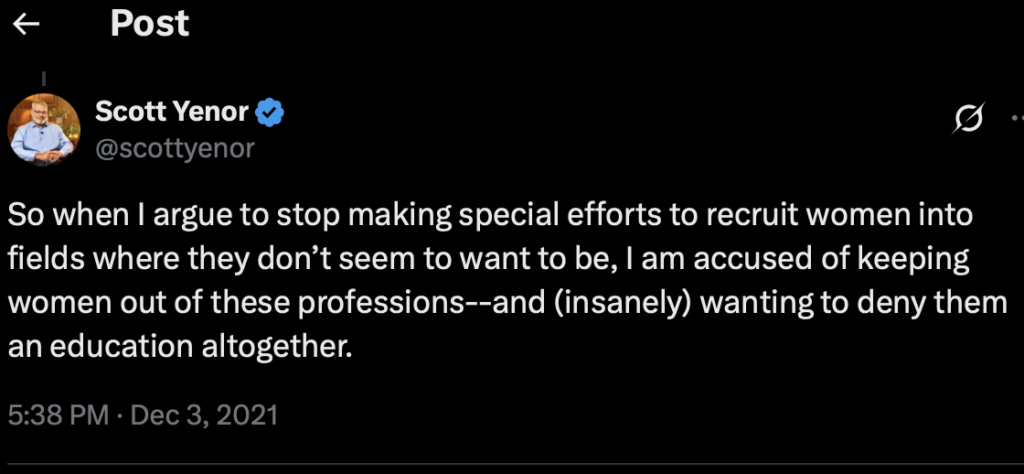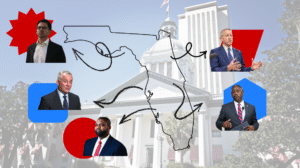Malcolm Gladwell, the New York Times best-selling author of The Tipping Point: How Little Things Make a Big Difference, defines social epidemics as the rapid and unexpected spread of ideas, behaviors and trends throughout a population. The trend of political leaders being appointed to Florida university boards has continued since the New College Board of Trustees gained six appointees in January 2023 at the behest of Republican Gov. Ron DeSantis.
The University of West Florida (UWF) and the University of South Florida St. Petersburg (USF St. Pete) are both facing political turmoil. DeSantis has appointed new members to UWF’s Board of Trustees, with some drawing parallels to the BOT upheaval at New College. USF St. Pete has ordered the removal of Pride, Black Lives Matter and other identity flags displayed on campus, citing proposed Florida legislation as justification. Some proposed Florida House and Senate bills threaten identity censorship on campus, others suggest a new system of appointing leadership in higher education.
Recently, schools in the Florida State University System (SUS) have appointed leaders with no background in academia at the university level. New College of Florida President Richard Corcoran, a previous Speaker of the Florida House of Representatives, was Florida Commissioner of Education before being appointed in October 2023. Florida Atlantic University (FAU) President Adam Hasner, appointed in February of this year, was a former Republican state representative who served as the vice president of a private prison company, The Geo Group. Notably, Hasner and Corcoran were appointed and approved over candidates with academic backgrounds.
Former Lt. Gov. Jeanette Nunez took up her latest post as interim President of Florida International University (FIU) in February. Previously, she served as Speaker Pro Tempore in the Florida House of Representatives and joined DeSantis on his ticket in his 2018 run, becoming Florida’s first Latina lieutenant governor. While Nunez has no prior administrative experience at universities, it should be noted that she does hold undergraduate and graduate degrees from FIU and has taught courses there.
On Jan. 6, 2025, DeSantis appointed eight new members to the UWF Board of Trustees, a public university in Pensacola. The appointees included Adam Kissel, a fellow at the Heritage Foundation, the conservative Washington-based think tank behind the controversial Project 2025; Scott Yenor, a fellow at the Claremont Institute, a conservative California-based think tank described by the New York Times as “a nerve center of the American right,” and Gates Garcia, a 2024 fellow at Claremont. Garcia is a Tampa-based CEO of a private equity firm, hosts the video podcast “We the People” and contributes to “pro-America and pro-free speech” outlet Blaze Media. Appointee and Student Affairs Committee member Paul Bailey is an attorney and adjunct professor at Pensacola Christian College.
While the Florida governor and Board of Governors are able to appoint members to the boards of public colleges and universities, they must ultimately be confirmed by the Florida Senate. A person is not necessarily guaranteed a board position just by having DeSantis’ support. For instance, one of the DeSantis-backed appointees to New College’s board, Jason “Eddie” Speir, was rejected by the Senate after holding his position for about five months, following his visits to campus in an attempt to spread the teachings of Jesus Christ to students.
On March 31, the Senate Appropriations Committee on Higher Education also rejected Kissel as an appointee. Kissel was questioned about his connection to the Heritage Foundation and its education policy initiative for Project 2025, and he affirmed “he agrees with everything in it.” He has written about his wish to privatize public schools: “In this scenario, the institution immediately becomes private as part of the legislation. The ironclad provision tied into the appropriation and bond is that the university will never again ask for or receive a penny in state funding.”
Kissel would need to be confirmed by the Senate Ethics and Elections Committee if DeSantis were to attempt to reappoint him.
As a member of the male-only Society for American Civic Renewal, Yenor has focused on dismantling social justice initiatives in American universities. In his address at the second National Conservatism Conference in 2021, he called independent women “medicated, meddlesome and quarrelsome” and “feminist overlords.” He also called universities “the citadels of gynecocracy”—governments run by women.
“In order to reach what they [colleges and universities] believe is an imperative for a just and equitable distribution of engineers, they set up scholarships and programs aimed at ‘inspiring’ young women to enter the field. They shouldn’t be doing this,” Yenor posted on X. “That effort, I believe, is misplaced energy in the service of ideology; the policy is based on faulty assumptions about what they think women should want to do with their lives—rather than what women actually want.”

Domani Turner-Ward, a UWF master’s student, spoke to Old School Catalyst about their experience attending the school and speaking out in Tallahassee against the board appointments.
“I fell in love with the campus the first time I went on a campus tour. I immediately knew I was home,” Turner-Ward said. “I’m so grateful to be a part of a community like that.”
UWF, located in Pensacola in a conservative district, is smaller and less prominent than other Florida public universities, qualities Ward said they believe influenced DeSantis to target it. “UWF was targeted because we’re teaching ‘gender ideologies,’ which I can tell you, is not true. The actual reason might be that we’re a little bit smaller than a lot of the universities of Florida, and we’re also less well known, and we’re also in a historically red county.”
Ward spoke against the new appointments to the board. They expressed their concern about women’s education on campus due to Yenor’s comments, as well as Kissel’s push to privatize public institutions. “There was this rising panic that women would no longer have the same opportunities as men at the University of West Florida because of the rhetoric that one of the new appointed trustees uses. Adam Kissel has written extensively about some very troubling topics, like an argument for the privatization of universities.”
Ward commented that most of the newly appointed trustees were quite unfamiliar with Pensacola and UWF. Trustee Rachel Moya, appointed to the board in December 2024, “had not stepped foot into downtown Pensacola until a couple of weeks prior to this hearing,” according to Ward.
“Our university has relationships throughout the entirety of downtown,” Ward said. “These members not having any familiarity with them is deeply concerning. How could she possibly advocate for these partnerships and these projects?”
Opponents of the board changes banded together under the name Save UWF, a grassroots organization made up of concerned students and Pensacola residents, much like the Save New College movement. A town hall meeting held on March 18 drew more than 300 community members who protested the appointments.
“One of my personal concerns is that this is a stepping stone,” Ward told Old School Catalyst. “That it started at New College, and UWF was the next step to see how this kind of political experimentation would go over at a larger university. Then move on to places like USF. I am hopeful that by putting up such a fight at our university, we can at least slow down the spread.”
On April 9, Yenor resigned from the UWF Board of Trustees in an email to UWF President Martha Saunders, citing “opposition” to his appointment as the cause.
On April 14, Garcia submitted a letter of resignation to DeSantis, writing, “I discovered over the past three months that there is a large and vocal constituency group of UWF that strongly believes that its board should be comprised of residents of the Panhandle.”
“But that doesn’t mean our fight is over,” Ward said. “In terms of camaraderie, I found myself speaking with people and working with students I never would have expected myself to work with. One of the most encouraging things about this situation is that I’ve been able to talk to and work with people from across the entire political spectrum on this issue, and it’s brought together Republicans and Democrats and I think that’s really powerful.”
In a similar pattern of political disruption encroaching on the collegiate learning environment, across the state, the University of South Florida St. Petersburg has undergone changes to public displays of identities on campus. This is much like New College’s recent policies on student dorm window displays and previous crackdowns against chalking.
Two recent companion bills target campus expression in a similar way: HB 75 and SB 100 both propose prohibiting “governmental entities from erecting or displaying certain flags,” and specifically ban flags that represent “racial, sexual orientation and gender” from public schools, colleges and universities. At the time of this article’s publication, SB 100 was withdrawn before it could be heard in the Senate and HB 75 did not pass.
On July 14, 2024, USF St. Pete staff was mandated to remove Black Lives Matter flags, Pride flags and flags of countries representing the nationalities of members of the student body from the University Student Center (USC), and students were unaware until the fall semester. The aforementioned bills were being considered and debated in the Florida legislature, but had not been signed into law. Even so, USF President Rhea Law cited renovation changes as justification for removal of the flags. The USF leader is based in Tampa but also has administrative jurisdiction over USF St. Petersburg and USF Sarasota-Manatee. Carrie O’Brien, spokesperson for USF, stated that the university did not receive any directive from the Governor.
“During our review, it was noted there was not a reliable or comprehensive process for selecting and rotating the flags in the USC,” O’Brien said. “We have temporarily removed all flags until we can convene a group of students, faculty and staff to solicit their input on all aspects of the renovation during the fall semester.”
“The university did it very hush-hush after a complaint from a parent was filed, but they cited it was due to structural changes that the USC itself was undergoing,” USF sophomore Amanda Weakley told Old School Catalyst. “Many students were outraged at the removal of these flags. I thought it was a very immature decision on the university’s behalf to remove the flags without consulting students who should have been in the process.”
According to Weakley, a student organization found out in August about the flag removal and contacted other student organizations. There was no communication by administration to students. In February, Weakley and others demanded answers from USF Regional Chancellor Christian Hardigree at a student town hall. Hardigree stated that as long as the bills were on the Senate and House floors, the university would not reinstate the flags.
“[Hardigree] said that if you fight with a pig in the mud, you’re both going to get muddy, and the pig is going to like it,” Weakley said. “She also said that the university has an identity problem, but when asked about any sort of tangible pieces of work she would be putting in to make sure that students felt seen on this campus, she did not give anything.”
Weakley, along with three other students, created the College Students for Expression, a campus organization dedicated to getting the flags back up and fighting campus censorship. The group’s petition for reinstating the flags has more than 300 student signatures, which is close to 10% of the student population. They have also created a zine where students have submitted writing or artwork to express their frustrations with the administration and celebrate their identities.
“We’re currently focused on bringing our flags back as a tangible representation of the identity on our campus, but like our name says, we’re for expression and we want to start working with other college campuses in Florida to protect students’ rights to expression and ensure that students’ voices are able to be safely heard” Weakley explained.
Hardigree is a finalist for the presidential position at Murray State University. USF’s leader and alumna, Rhea Law, has also announced plans to step down, stating that politics was not a factor in her decision. Weakley expressed worry over who will decide on Law’s replacement, and if the appointment will mirror Corcoran’s at New College.
A bill that passed the Florida House on April 16th, HB 1321, would create term limits for board of trustee members and repeal a 2022 law that provides exemptions to public records and public meetings laws for presidential searches. It would further require disclosure of financial records for members of the Board of Governors. Most notably, HB 1321 would compel college and university trustees to either be Florida residents or graduates of the host institution. This bill is significant both for its bipartisan support—with 104 yea votes to just 8 nays—and for how it would effectively end the tenure of DeSantis-appointed trustees like New College’s Chris Rufo, who is neither a New College alum nor a Florida resident.
“I believe that requiring residency, requiring a connection to the community, is a huge step in the right direction to make sure that these trustees are being appointed for their community connection,” Ward said. “Requiring residency or connection to the state university system is a really great step… with ensuring that Florida University trustees are good candidates for representing their communities and its needs.”
The companion bill, SB 1726, also creates term limits for Board of Trustee members. It is currently under consideration in the Senate, but the clock is ticking before this session of the Florida Legislature ends on May 2. If the House and Senate bills make it into law, they will take effect on July 1, but DeSantis has threatened to veto them, setting the stage for future drama in Tallahassee.




